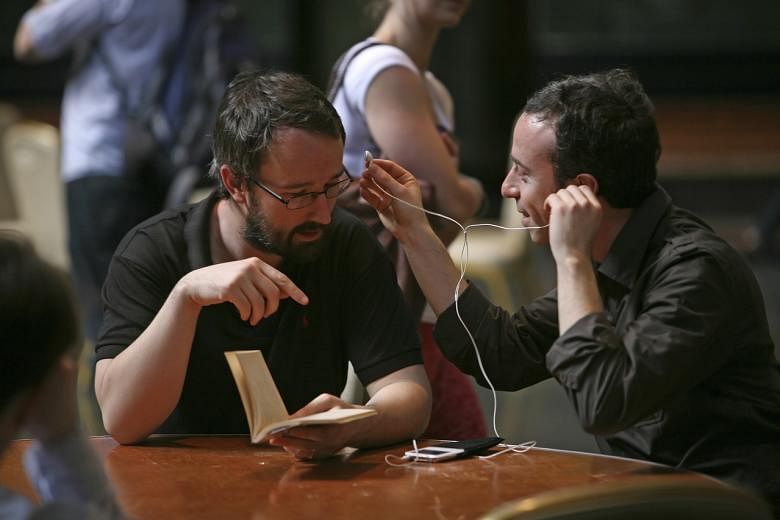NEW YORK (NYTIMES) - Over the past few years, I have been obsessed with the work of Australian novelist Liane Moriarty. Yes, me and everyone else. Ever since her 2014 blockbuster, Big Little Lies, Moriarty has become one of the publishing industry's most dependable hitmakers.
Although her prose is unflashy and her subject matter seemingly pedestrian - Moriarty writes tightly plotted domestic dramas about middle- and upper-middle-class suburbanites - her observations are so precise, her characters' psychology so well realised that I often find her stories burrowing deep into my brain and taking up long, noisy residence there.
But now a confession: I heap all this praise on Moriarty having technically never read a word she's written. Instead, I have only listened. The English audiobook versions of her novels are read by Caroline Lee, a narrator whose crystalline Australian cadences add to Moriarty's stories what salt adds to a stew - necessary depth and dimension.
I binged Moriarty's latest offering, Apples Never Fall, in a day and a half, and when I was done, I began to wonder who deserved the greater share of praise - the author or the narrator.
When the market for audiobooks began to skyrocket in the past decade, people would sometimes wonder whether they counted - that is, when you listened to the book, could you say that you had read it? The audio version of a book was often considered a CliffsNotes-type shortcut. It was acceptable in a pinch; but as a matter of cultural value, audio ranked somewhere lower than the real, printed thing.
I rise now to liberate the audiobook from the murky shadow of text. Audiobooks aren't cheating. They aren't a just-add-water shortcut to cheap intellectualism. For so many titles in this heyday of audio entertainment, it's not crazy to ask the opposite: Compared to the depth that can be conveyed via audio, does the flat text version count?
Obviously, there are writers and subjects that translate poorly to audio; writers who excel at a kind of textual virtuosity, like David Foster Wallace, are better read than listened to. I have also had trouble listening to dense, especially technical books, mainly because audiobooks are often consumed while multitasking.
Yet there are just as many books that achieve a resonance via the spoken word that their text alone cannot fully deliver. Listening to a book is not only just as good as reading it. Sometimes, perhaps even often, it's better.
For a certain kind of literary snob, them's fighting words, I know. But consider one of the publishing industry's most popular genres, the memoir. When they're read by the author, I've noticed that audio versions of memoirs sparkle with an authenticity often missing in the text alone. In fact, it is the rare memoir that doesn't work better as audio than as text.
A fine recent example is Greenlights, by actor Matthew McConaughey. As text, his story is discursive and sometimes indulgent, but as audio, in his strange and irresistible staccato speaking style, it exemplifies exactly the kind of weirdness that makes him so intriguing as an actor and celebrity.
As I listened to Greenlights, I realized how much extratextual theatre was going on; there's a way in which McConaughey, through his delivery, conveys emotion that is almost entirely absent from his text.
As spoken-word audio has taken off, the publishing industry and Amazon, whose Audible subsidiary is the audiobook business's dominant force, have invested heavily in the medium.
Now audiobooks often benefit from high-end production and big-name voice talent, and there are innovations in digital audio - like spatially rendered sound, which gives listeners a sense of being surrounded by audio - that may turn audiobooks into something like radio dramas.
Still, as popular as audiobooks have become, I suspect there will remain some consternation about their rise, especially from book lovers who worry that audio is somehow eclipsing the ancient sanctity of text and print.
But that is a myopic view. Telling stories, after all, is an even older form of human entertainment than reading and writing stories.
Banish any guilt you might harbor about listening instead of reading. Audiobooks are not to be feared; they do not portend the death of literature on the altar of modern convenience. Their popularity is a sign, rather, of the endurance of stories and of storytelling.

